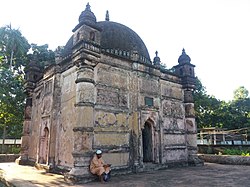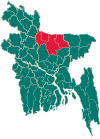|
Jhenaigati Upazila
Jhenaigati (Bengali: ঝিনাইগাতী) is an upazila of Sherpur District[3] under the division of Mymensingh, Bangladesh. GeographyJhenaigati is located at 25°11′00″N 90°04′00″E / 25.1833°N 90.0667°E. It has 30,113 households and a total area of 231 km2. The upazila is bounded by the Meghalaya State of India on the north, Sherpur sadar and Sreebardi upazila on the south, Nalirabari upazila on the east, and Sreebardi upazila on the west. The main rivers are Shomeshwari, Maharashi and Subarnakhali.[4] DemographicsAccording to the 2011 Census of Bangladesh, Jhenaigati Upazila had 41,117 households and a population of 160,452. 40,678 (25.35%) were under 10 years of age. Jhenaigati has a literacy rate (age 7 and over) of 38.7%, compared to the national average of 51.8%, and a sex ratio of 1017 females per 1000 males. 5,730 (3.57%) lived in urban areas. Ethnic population is 5931 (3.70%), of which 3,040 are Garo, 1,414 Koch, 659 Barman and 818 others.[6][7] As of 2001 Bangladesh census, Jhenaigati upazila had a population of 1,60,554; males constituted 78791 of the population, females 76276; Muslim 146,153, Hindu 5,435, Christian 3,388 and others 91.[3] AdministrationJhenaigati Thana was formed in 1975 and it was turned into an upazila in 1983.[3] Jhenaigati Upazila has a Upazila Council and seven union councils: Kangsha, Dhanshail, Nalkura, Gouripur, Jhenaigati Sadar, Hatibandha and Malijhikanda.[8] The union councils are subdivided into 75 mauzas and 117 villages.[9] U.N.O office, police station, banks, and many NGOs are here. Operationally important NGOs are BRAC, Asa, Grameen Bank, World Vision, SDS, Rangtia Satata Samchay, Rindan Samity and Didar Sangha. See alsoReferences
Wikimedia Commons has media related to Jhenaigati Upazila. |
||||||||||||||||||||||||||||||||


